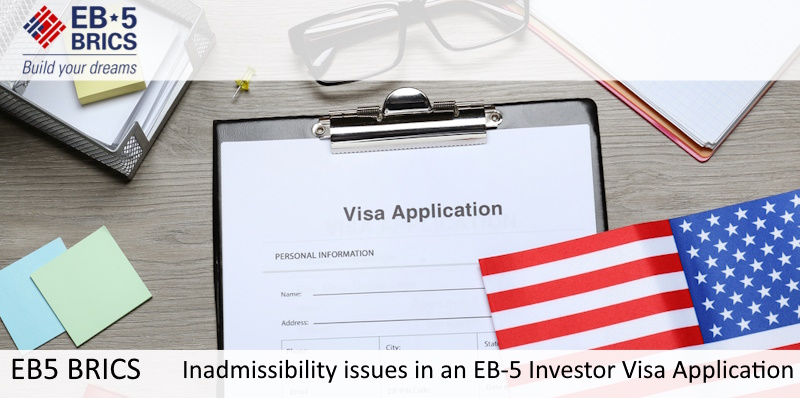
An EB-5 Investor Visa enables foreign investors to attain permanent residency in the U.S. immediately upon entering the country. However, potential immigrants pursuing the EB-5 Investor Visa may encounter inadmissibility issues. There are various reasons for inadmissibility and ways to avoid and contest such findings. Read on to learn more about this topic.
What does inadmissible mean when it comes to immigration?
The term inadmissible refers to individuals who are not allowed to enter or remain in the United States.
What are the inadmissible reasons that EB-5 investors face when applying for a US visa?
Prospective applicants under the EB-5 Immigrant Investor Visa Program may harbor significant concerns about inadmissibility to the United States. Inadmissibility issues for EB-5 visa applicants can stem from challenges related to the investor’s credentials, labor certification, health, criminal record, or security concerns. Neglecting to ensure that their application is not susceptible to these immigration obstacles is a common mistake investors make.
The usual reasons that EB-5 investors are inadmissible for a US visa are:
• Health-related grounds. To prevent medical inadmissibility, investors must submit a comprehensive medical exam conducted by a physician licensed in the United States. This can be done by a doctor designated by the United States (or by a civil surgeon if you are asking for status adjustment) if you are processing your visa outside of the United States.
Health-related grounds include the following.
1. Communicable diseases
2. Lack of proof of required vaccinations
3. Physical/mental disorders with associated harmful behavior
4. Drug abuse or addiction
• Criminal grounds. Having a prior record of offenses such as substance abuse, smuggling, prostitution, money laundering, or Crime Involving Moral Turpitude (CIMT) may result in a permanent ban from applying for an EB-5 visa.
• Misrepresentation. Falsification of any personal information will also result in an investor’s permanent inadmissibility to enter the United States. This applies to everyone who has committed an immigration offense, including unlawful entrants, overstayers, previously expelled aliens, and those who falsely claim to be citizens of the United States. This also applies to applicants who purposefully withhold facts pertinent to the visa application.
When do you know if you are inadmissible?
When you apply to the United States government for a visa or green card, you’ll be asked questions about your background, notably about your criminal and immigration history. Green card candidates must have a medical examination, as well as have their fingerprints collected and compared to various law enforcement databases.
Typically, the immigration authorities will not examine your application responses or the findings of your medical examination or background check until your visa or green card interview.
However, if you appear to be inadmissible, you will not always be denied immediately. The immigration officer may grant you time to demonstrate that the finding was incorrect or to ask for a waiver (if the inadmissibility reason is eligible for a waiver).
Can you get a waiver for inadmissibility?
It depends. Those who are ineligible to enter the United States and are applying for an immigrant visa, adjustment of status, specific nonimmigrant statuses, or other immigration benefits are required to submit Form I-601 (Application for Waiver of Grounds of Inadmissibility). This form is necessary to request a waiver for specific reasons that render an individual inadmissible. All waivers of inadmissibility are discretionary. You can seek help from EB5 BRICS on how to present your specific situation.
EB5 BRICS is available to help you with any questions related to immigration. Reach out to us through Live chat or Call Us.




